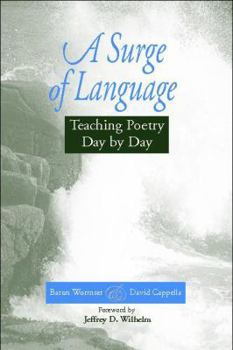A Surge of Language: Teaching Poetry Day by Day
Poetry is part of the 7-12 English curriculum, but many students, and teachers too, are afraid of it. They think of poetry as esoteric, insular, even elitist. Baron Wormser and David Cappella prove otherwise. Poetry is in fact the lifeblood of language. It incorporates all aspects of the language arts. It deserves to be at the center of the English curriculum. And it can and should be taught daily. The authors show why and how. Their book takes the form of a fictional teacher's journal entries on his daily teaching of the reading and writing of poetry. His recurrent theme for appreciating poetry is to "slow down, pay attention-there is much to be gained from this." And he demonstrates that truth. He looks at language closely-how the poet uses language, revises, edits, and assesses; how potent language really is; how the fewest words can achieve the greatest impact. What's more, he highlights within the text major ideas for teaching and provides other teacher-friendly formats and information, including: lists that detail practical exercises and strategies full-length poems anthologies for teacher reference. Plus, the table of contents functions as a calendar of daily topics, making quick work of planning or honing in on areas of particular interest. A Surge of Language is the perfect antidote to pressure and stress. And it's a richer, more rewarding alternative to the lists of objectives that now comprise teaching. Both thoughtful and practical, it will inspire and guide teachers in their efforts to put some reflective practice back into their curriculums and classrooms. And it will get them to think in poetry, too.
Format:Paperback
Language:English
ISBN:0325006067
ISBN13:9780325006062
Release Date:February 2004
Publisher:Heinemann Educational Books
Length:256 Pages
Weight:0.72 lbs.
Dimensions:0.6" x 6.2" x 9.3"
Age Range:12 to 17 years
Grade Range:Grades 7 to 12
Customer Reviews
2 ratings
A Wonderful Book for Poets and Nonpoets Both
Published by Thriftbooks.com User , 17 years ago
As a fiction writer, poetry has always seemed somehow mystical to me. This wonderful book makes it as accessible and understandable as my own stories. Bless the authors for so wonderful a resource!
Must-Reading for All English Teachers
Published by Thriftbooks.com User , 21 years ago
In this highly readable text, Wormser and Cappella pose as "Mr. P.," a veteran English teacher who puts poetry at the center of his teaching. The text itself poses as Mr. P.'s journal and is reminiscent of Thoreau's Walden Pond. Taking us through a single school year, Mr. P. records in an engaging, unprofessorial manner both a philosophy of teaching and a rationale for making poetry an integral and daily part of the English curriculum. In separate entries, he describes his interactions with poems and with students. Woven throughout these entries are poems, teaching strategies, poetry prompts, and tips on guiding students through analysis of poems--their own and others'. Teachers who are already committed to poetry will find much here to re-energize their teaching; teachers who are not fully comfortable with poetry will gain confidence and may well find their teaching of poetry revolutionized.





